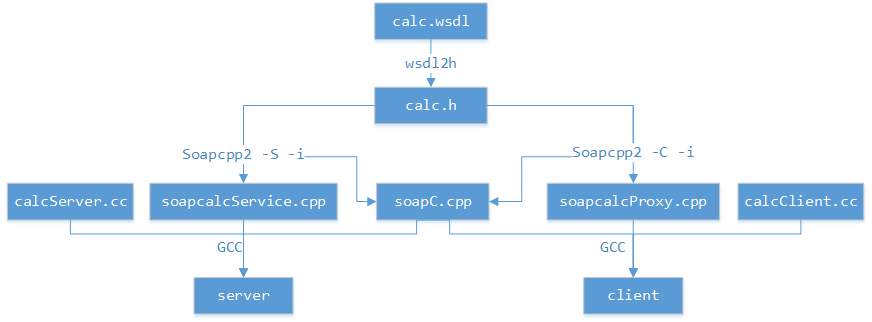gSOAP is used to implement a simple server and proxy for four operations.
Table of Contents
Generate server and client (agent) programs
Try to use gSOAP to realize a simple server code of four operations, and give
Header file
Write the header file calc.h
//gsoap ns service name: calc Simple calculator service //gsoap ns service style: rpc //gsoap ns service encoding: encoded //gsoap ns service namespace: http://localhost/calc.wsdl //gsoap ns service location: http://localhost/server.cgi //gsoap ns schema namespace: urn:calc //gsoap ns service method: add Sums two values int ns__add(double a, double b, double *result); //gsoap ns service method: sub Subtracts two values int ns__sub(double a, double b, double *result); //gsoap ns service method: mul Multiplies two values int ns__mul(double a, double b, double *result); //gsoap ns service method: div Divides two values int ns__div(double a, double b, double *result); //gsoap ns service method: pow Raises a to b int ns__pow(double a, double b, double *result);
Note that "\\\\\" in NS add is double underlined.
Generate header file calc.h
You can also generate a header file through the wsdl 2H instruction by using a wsdl file, as follows:
How to use wsdl2h
wsdl 2H is used as the conversion of wsdl and. H files. soapcpp2 uses header files to generate h and cpp files needed for client / server development. Some frequently used instructions are as follows: - o filename.h converts the wsdl to a filename.h header file. - s does not generate STL code - C generates pure C-style header files, which will remove some features of C + + - N name use name instead of the default prefix ns - t filename.dat use filename.dat instead of the default typemap.dat file - zX compatible with previous versions of X
Generate server and client (agent) programs
Then the corresponding soap proxy code is generated by using the soapcpp2 instruction. The common options and usage of soapcpp2 are as follows:
How to use soapcpp2
wsdl 2H is used as the conversion of wsdl and. H files. soapcpp2 uses header files to generate h and cpp files needed for client / server development. Some frequently used instructions are as follows: - i generates the proxy and object of the server, which are inherited from the soap struct. - j is similar to - i, except that the generated proxy class does not inherit from soap struct, but contains a pointer containing a soap structure. Agent classes that live in this way are easy to communicate with each other - C generate client code only - S only generates server code - x does not generate an xml file. Without this, a descriptive xml file will be generated for each operation defined in the header file - L does not generate soapClientLib and soapServerLib files - p name changes the filename prefix instead of soap - q name specifies the namespace name used by proxy classes and objects, including the filename prefix
Can be passed separately
soapcpp2 -S -i calc.h
and
soapcpp2 -C -i calc.h
Generate the server and client (agent) programs soapcalcService.cpp, soapcalcProxy.cpp.
Complete makefile
HDR_CALC:=calc.h
SRC_SERVER:=calcServer.cc
SRC_CLIENT:=calcClient.cc
SOAP_SRV:=soapC.cpp soapcalcService.cpp
SOAP_CLT:=soapC.cpp soapcalcProxy.cpp
LIBS:=-lgsoap++
all: server client
#-i: generate C + + service agents and objects inherited from soap structure.
${SOAP_SRV}:${HDR_CALC}
soapcpp2 -S -i ${HDR_CALC}
${SOAP_CLT}:${HDR_CALC}
soapcpp2 -C -i ${HDR_CALC}
client:${HDR_CALC} ${SOAP_CLT}
g++ -o client ${SRC_CLIENT} ${SOAP_CLT} ${LIBS}
server:${HDR_CALC} ${SOAP_SRV}
g++ -o server ${SRC_SERVER} ${SOAP_SRV} ${LIBS}
clean:
rm -rf client server *.xml *.nsmap soap*Client & server code
Server code calcServer.cc
#include "soapcalcService.h"
#include "calc.nsmap"
int main(int argc, char **argv)
{
calcService calc;
if(argc < 2)
{
fprintf(stderr, "Usage: calcserver++ <port>\n");
exit(0);
}
if (argc < 2)
calc.serve(); /* serve as CGI application */
else
{
int port = atoi(argv[1]);
if (!port)
{
fprintf(stderr, "Usage: calcserver++ <port>\n");
exit(0);
}
/* run iterative server on port until fatal error */
if (calc.run(port))
{
calc.soap_stream_fault(std::cerr);
exit(-1);
}
}
return 0;
}
int calcService::add(double a, double b, double *result)
{
*result = a + b;
return SOAP_OK;
}
int calcService::sub(double a, double b, double *result)
{
*result = a - b;
return SOAP_OK;
}
int calcService::mul(double a, double b, double *result)
{
*result = a * b;
return SOAP_OK;
}
int calcService::div(double a, double b, double *result)
{
if (b)
*result = a / b;
else
{
char *s = (char*)soap_malloc(this, 1024);
// (SOAP_SNPRINTF(s, 1024, 100), "<error xmlns=\"http://tempuri.org/\">Can't divide %f by %f</error>", a, b);
snprintf(s, 1024, "<error xmlns=\"http://tempuri.org/\">Can't divide %f by %f</error>", a, b);
return soap_senderfault("Division by zero", s);
}
return SOAP_OK;
}
int calcService::pow(double a, double b, double *result)
{
*result = ::pow(a, b);
if (soap_errno == EDOM) /* soap_errno is like errno, but compatible with Win32 */
{
char *s = (char*)soap_malloc(this, 1024);
// (SOAP_SNPRINTF(s, 1024, 100), "<error xmlns=\"http://tempuri.org/\">Can't take power of %f to %f</error>", a, b);
snprintf(s, 1024, "<error xmlns=\"http://tempuri.org/\">Can't take power of %f to %f</error>", a, b);
return soap_senderfault("Power function domain error", s);
}
return SOAP_OK;
}
Client code calcClient.cc
#include "soapcalcProxy.h"
#include "calc.nsmap"
char server[256] = "http://127.0.0.1:";
int main(int argc, char **argv)
{
if (argc < 5)
{
fprintf(stderr, "Usage: [add|sub|mul|div|pow] num num port\n");
exit(0);
}
double a, b, result;
a = strtod(argv[2], NULL);
b = strtod(argv[3], NULL);
calcProxy calc;
strcat(server, argv[4]);
calc.soap_endpoint = server;
switch (*argv[1])
{
case 'a':
calc.add(a, b, &result);
break;
case 's':
calc.sub(a, b, &result);
break;
case 'm':
calc.mul(a, b, &result);
break;
case 'd':
calc.div(a, b, &result);
break;
case 'p':
calc.pow(a, b, &result);
break;
default:
fprintf(stderr, "Unknown command\n");
exit(0);
}
if (calc.error)
calc.soap_stream_fault(std::cerr);
else
printf("result = %g\n", result);
return 0;
}
Function
One terminal: $ ./server 121212 Another terminal: $ ./client add 123 234 121212 result = 357
Whole process


